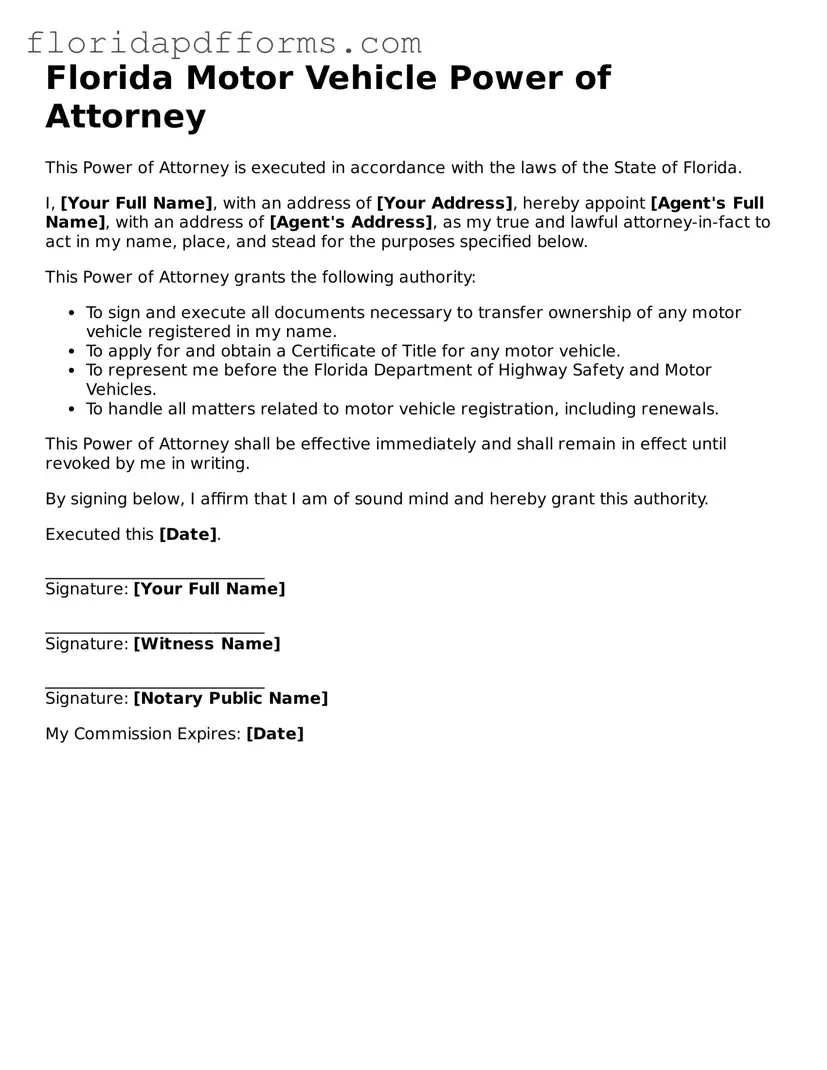The Florida Motor Vehicle Power of Attorney form is similar to a General Power of Attorney. A General Power of Attorney allows an individual to appoint someone else to handle a wide range of financial and legal matters on their behalf. Like the Motor Vehicle Power of Attorney, this document grants authority to another person, but it covers broader areas beyond just motor vehicle transactions. Both forms require clear identification of the principal and the agent, and they must be signed and, in some cases, notarized to be legally binding.
Another document that shares similarities is the Durable Power of Attorney. This form also allows someone to act on another's behalf, but it remains effective even if the principal becomes incapacitated. In the context of vehicle transactions, a Durable Power of Attorney can be used to manage the sale, registration, or transfer of a vehicle, similar to the Motor Vehicle Power of Attorney. Both documents empower an agent to make decisions and take actions that are legally binding.
The Limited Power of Attorney is another related document. This form restricts the agent's authority to specific tasks or time periods. For instance, a Limited Power of Attorney could grant someone the ability to sell a car while the owner is away. Like the Motor Vehicle Power of Attorney, it is important to specify the exact powers granted to the agent. Both forms require careful consideration of the scope of authority given.
A Medical Power of Attorney is also similar, though it pertains to healthcare decisions rather than vehicle matters. This document allows an individual to designate someone to make medical decisions if they are unable to do so. While the focus is different, both documents emphasize the importance of appointing a trusted person to act on one’s behalf, highlighting the need for clear communication about the authority granted.
The Real Estate Power of Attorney is another comparable document. This form allows an individual to authorize someone to manage real estate transactions, such as buying or selling property. Like the Motor Vehicle Power of Attorney, it requires the principal to specify the powers granted to the agent. Both documents serve to facilitate transactions that the principal cannot handle personally, ensuring that their interests are represented.
The Financial Power of Attorney is also relevant. This document allows an individual to appoint someone to manage their financial affairs, including banking, investments, and property management. While it covers a broader range of financial matters, the underlying principle is the same as with the Motor Vehicle Power of Attorney: granting authority to another person to act in the principal’s best interests.
The Revocable Living Trust can be compared as well. Although primarily used for estate planning, it allows a person to transfer assets into a trust while retaining control over them. In some cases, a trustee may need to handle vehicle-related matters. Both documents aim to streamline decision-making and ensure that the principal’s wishes are followed, though they operate in different contexts.
Finally, the Authorization for Release of Information form shares some similarities. This document allows individuals to authorize the release of their personal information to a designated person or organization. While it does not grant decision-making authority like the Motor Vehicle Power of Attorney, both forms involve the delegation of authority and the importance of protecting personal interests.

